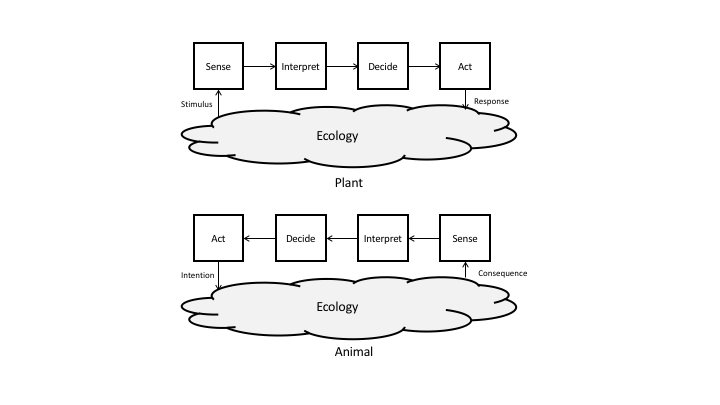 Ever since the Cybernetic Hypothesis was introduced to Psychology, there has been greater appreciation of the "intentional" nature of cognitive systems. Yet, despite this awareness, causal (or stimulus-response) forms of explanation continue to dominate the way many people think about how humans (and other animals) process information. For example, most cognition texts begin with sensation and then follow 'stimulation' through successively deeper levels of processing (perception, decision-making ...).
Ever since the Cybernetic Hypothesis was introduced to Psychology, there has been greater appreciation of the "intentional" nature of cognitive systems. Yet, despite this awareness, causal (or stimulus-response) forms of explanation continue to dominate the way many people think about how humans (and other animals) process information. For example, most cognition texts begin with sensation and then follow 'stimulation' through successively deeper levels of processing (perception, decision-making ...).
A result of this framing is an at least implicit suggestion that sensations cause action. And there is a danger that people fail to appreciate many of the significant aspects of the circular coupling of perception and action (e.g., self-organization to skillfully and creatively adapt to the ecology) that differentiate animals from plants.
While it is true that in a circular coupling, there is no sense in which any element in the circle must be given priority as "the cause," I wonder if a simple reorganization of how we depict the dynamic would help people to break away from conventional notions of causality and to better appreciate the intentional dynamic of cognitive systems.
Perhaps, the most important implication of the Cybernetic Hypothesis is that 'action' becomes the prime mover of the dynamic. In a framing that gives priority to action, looking becomes the prerequisite for seeing, and the function of our senses is to serve, rather than to cause action.

Exactly
Excellent John.
Exactly
Excellent John.
Love this. I'm in the process of engaging in these conversations with stakeholders across my company, challenging them to shift the paradigms they are using in both system design/development and interpersonal relationship management. This question is going to be a nice kickoff to more of those conversations.
Love this. I'm in the process of engaging in these conversations with stakeholders across my company, challenging them to shift the paradigms they are using in both system design/development and interpersonal relationship management. This question is going to be a nice kickoff to more of those conversations.
The feedforward putting the closed loop at work
The question of "feedforward" and how it relates to anticipation and control is another whole can of worms. I think that there are many inconsistencies in how people use this term. Additionally, for humans there are multiple loops all acting at different timescales. But I think the simple realization that 'action' often drives perception is an important shift of perspective from how most psychologists understand the coupling of perception and action.
The feedforward putting the closed loop at work
The question of "feedforward" and how it relates to anticipation and control is another whole can of worms. I think that there are many inconsistencies in how people use this term. Additionally, for humans there are multiple loops all acting at different timescales. But I think the simple realization that 'action' often drives perception is an important shift of perspective from how most psychologists understand the coupling of perception and action.
Even after years on reading about these things and working with these theories, I have found myself struggle with putting this things into words when put on the spot. The way you phrase things in terms of circles has been a great help in developing and clarifying my own thinking.